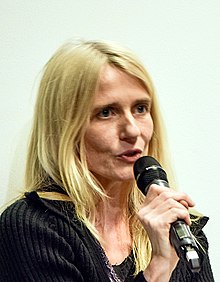Friederike Habermann
Friederike Habermann (born August 12, 1967 in Bad Rehburg ) is a German economist and historian. She writes, teaches and researches as a freelance scientist.
Life
Friederike Habermann became active in social movements in the early 1980s. 1986/87 she was the Federal Head Girl and 1987/88 she traveled through Asia. She then studied at the University of Hamburg .
After graduating, Habermann first headed the economic department of the daily newspaper Junge Welt in 1995 , but had to leave the paper again due to ideological differences and instead attended the International Meeting of the Zapatista Liberation Movement in Mexico in 1996 .
In 1998 Habermann took over the press coordination of the global networking of grassroots movements Peoples Global Action (PGA), which was established in Mexico . However, this was initially ignored, especially in Germany, which only changed after the protests at the WTO conference in Seattle in 1999 . In 2001, during the protests against the G8 summit in Genoa in 2001 , during which the Italian police shot a demonstrator, two days later the police also stormed the schools used as sleeping places, which were highly controversial.
Habermann spent the years 2000 to 2003 near her home in Steyerberg's Lebensgarten and on behalf of the Women's Initiative Foundation for several months in Argentina to research the crisis there . In 2007 Habermann received his doctorate from the FU Berlin with summa cum laude for Dr. phil. in political science. Today she lives near Berlin and is mainly involved in networking solidarity-based economic activity, including a. the Commons Institute based in Bonn.
Positions
With their "subject-founded theory of hegemony " Habermann assumes that identity categories such as gender or Rassifizierungen in the struggle for privileges such as access to resources, access to the body, hierarchical divisions of labor, etc. "designed" to be. From these theoretical considerations as well as from their experiences in “People's Global Action” results their conviction that the struggle for their own emancipation must always go hand in hand with the questioning of their own privileges.
In her book Ecommony describes current tendencies of a commons-based peer production in approaches other economic activity, based on the main principles of "ownership place property" and "contributing instead Swap". With this she combines the vision of a non-capitalist economy as a whole, based on “structural community” instead of “structural hatred” of competition.
In her most recent work, Exchanged , she explains why a truly emancipatory society must be free from equivalent exchange (“ free of exchange logic”). She argues that both the democratic regulation of market mechanisms and the nationalization of property fall short. She differentiates between aspects of competition and pressure to perform, and the associated fear, lack of time and alienation. On the other hand, it refers to the necessity of the exploitation of unpaid or less productive areas associated with equivalent exchange and thus every market through the price war, with corresponding consequences for nature, all caring activities and in the international relationship between nations.
Publications
Books
- with Ulrich Brand u. a. (Red.): Chiapas and the International of Hope. ISP, Cologne 1997, ISBN 3-929008-34-3 .
- Another world out of necessity. Lived resistance in Argentina. Edited by the Women's Initiative Foundation. Helmer, Königstein 2004, ISBN 3-89741-162-8 .
- The homo oeconomicus and the other. Hegemony, Identity and Emancipation. Nomos, Baden-Baden 2008, ISBN 978-3-8329-3716-4 ( Feminist and Critical Political Economy series. Ed. Uta Ruppert and Brigitte Young ).
- Peninsulas against the current. Live and do business differently in everyday life. Edited by the Women's Initiative Foundation. Helmer, Königstein 2009, ISBN 978-3-89741-284-2 .
- The invisible tropical helmet. How colonial thinking still rules our minds. DrachenVerlag, Klein Jasedow 2013, ISBN 978-3-927369-75-7 .
- History is made. Stages of global resistance. Laika, Hamburg 2014, ISBN 978-3-942281-52-2 .
- Ecommony. UmCare for togetherness. Edited by the Women's Initiative Foundation. Helmer, Sulzbach 2016, ISBN 978-3-89741-386-3 .
- Exchanged! Why the good life has to be free of exchange logic for everyone. Published by the Fraueninitiative Foundation, Ulrike Helmer-Verlag, Roßdorf near Darmstadt 2018, ISBN 978-3-89741-424-2 .
Essays
- Ecommony: Structural community instead of negative growth. In: Germany's ways into the future. Documentation of a UBA lecture series on more sustainability, ed. from the Federal Environment Agency 2012, pages 9 ff.
- We are not born egoists. In: Silke Helfrich, Heinrich Böll Foundation (Hrsg.): Commons - For a new policy beyond market and state. Transcript Verlag , Bielefeld 2014, pages 39-44, ISBN 978-3-8376-2835-7 .
- The good news: there is no such thing as capitalism without growth. degrowth.info, June 6, 2014
- Resistance is (really) global and (really) from below. degrowth.info, July 5, 2016
literature
- Lara Mallien: The Peninsula Researcher. Portrait of Friederike Habermann at oya -online.de, March 2010
- Markus Kollotzek: Friederike Habermann - the “good life for everyone” must be free of exchange logic. Detailed Interview at greennetproject.org, February 16, 2019
Web links
- Literature by and about Friederike Habermann in the catalog of the German National Library
Individual evidence
- ↑ a b c Lara Mallien: The peninsula researcher. Portrait. oya -online.de, March 2010, accessed on March 12, 2019 .
- ↑ Björn Wagner: The homo oeconomicus and the other. Review of Friederike Habermann's dissertation. pw-portal.de, March 3, 2009, accessed on August 20, 2014 .
- ↑ https://commons-institut.org/ does not list them, however, accessed on March 12, 2019.
- ↑ Friederike Habermann: We can (do business) differently. frauenmahl.de, May 2, 2013, accessed on 20 August 2014 .
| personal data | |
|---|---|
| SURNAME | Habermann, Friederike |
| BRIEF DESCRIPTION | German economist |
| DATE OF BIRTH | August 12, 1967 |
| PLACE OF BIRTH | Bad Rehburg |

